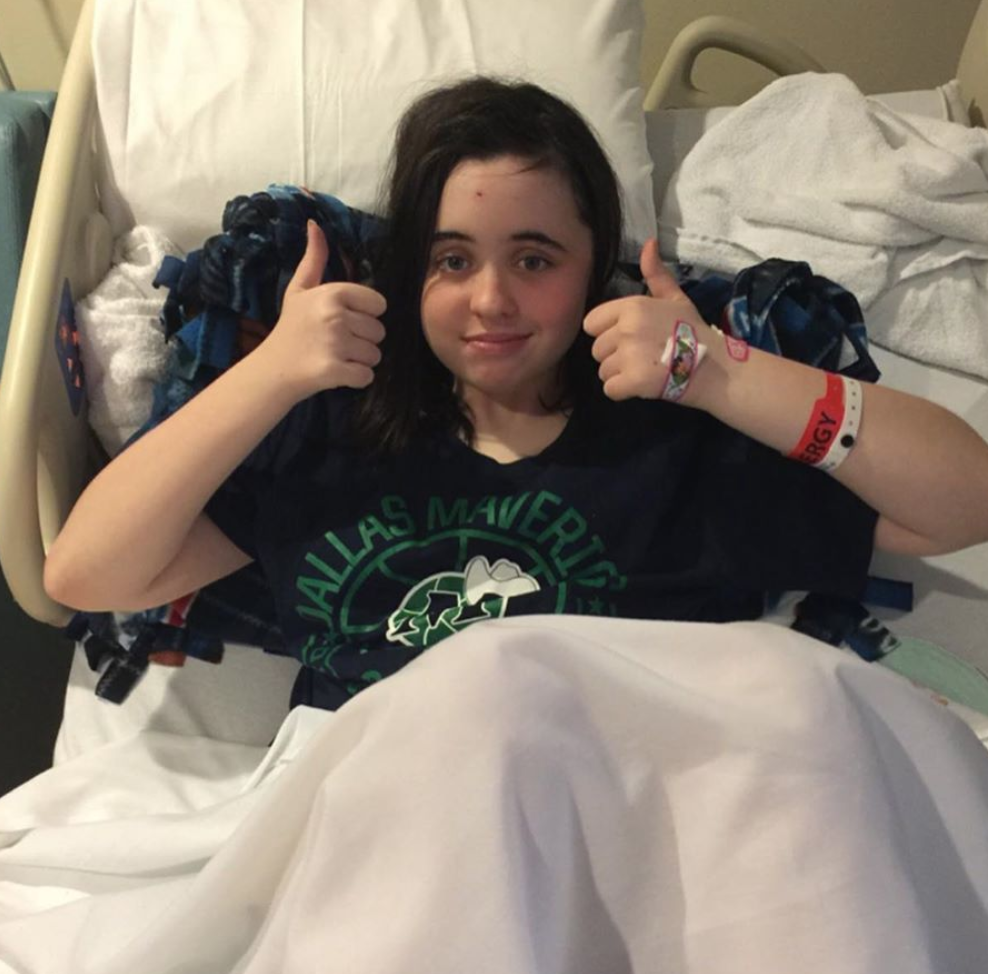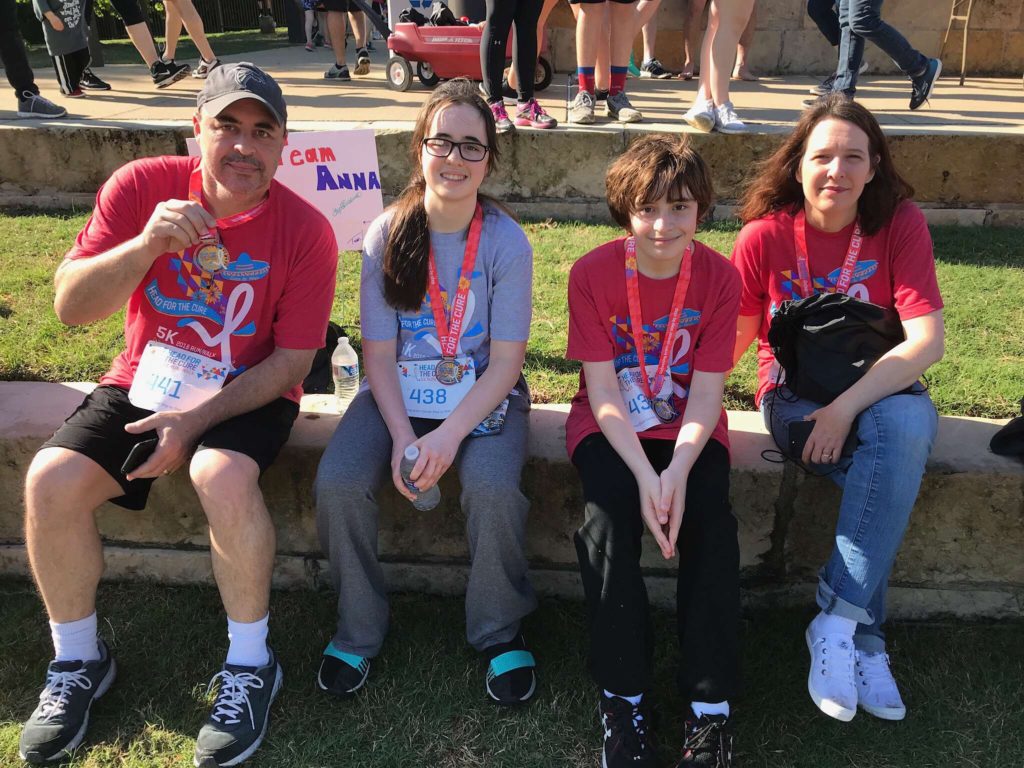Continuing the Fight After Surgery
February 28, 2020
Written by Head for the Cure Ambassador Anna Blackwell
When you’re diagnosed with any life-threatening disease, your life flashes before your eyes. You’re quick to think about the worst-case scenarios. You’re quick to resort to a countdown, as if you’re awaiting your demise. It’s beyond intimidating, and you feel immeasurably alone. I was 12 years old when my life flashed before my eyes. At 3:34 PM on February 11th, 2016, my life had changed forever.
My Diagnosis
At 3:34 PM, I received a text from my mother stating that I had a brain tumor, and that my dad was picking me up from school. I burst into tears as soon as I saw my father. As we walked to the car he told me that we were on our way to meet my brain surgeon. Within 5 minutes, I had gone from a normal kid to a kid undergoing brain surgery.
We drove in silence on the way to Medical City in Dallas. We made our way up the 4 floors to the doctor’s office, scared of what was next. My surgeon, Dr. Sacco, walked in and went over my brain MRI taken earlier that morning. He explained that the tumor was the size of a golf ball, and that it needed to be removed soon, as half of my vision had already been affected, and more would soon follow suit. We scheduled my brain surgery for Friday, February 25th, 2016. The only Friday I have yet to fret.
The build up to February 25th was unlike any other. Those 2 weeks went by so slow, and yet so fast. The immense support I had from friends and family was the only thing helping me put one foot in front of the other. It’s hard to think that bad circumstances yield unity, but they do. Family and friends are great like that. They helped make the days go by fast in a good way. So fast to where, before I knew it, it was February 23rd.
February 23rd, 2016 was the day of my pre-op appointment. Pre-op seems scary, but in-actuality, it’s pretty similar to a check-up. They took my temperature, blood pressure, weight, and height. They made sure I was good to go into surgery, and that I wasn’t fighting a common cold, or anything that could affect the surgery. Pre-op went smoothly, vitals were good (I had a minor fever, but overall controlled), and everything was set. Within 48 hours, my life would forever be changed.
Surgery Day
February 24th went by quickly and then it was the big day. February 25th. Brain surgery. I woke up at 5 AM, tossed on my lucky shirt, and then we headed off to the hospital. I was feeling a mix of emotions as we headed back to Medical City; fear that I’d never wake up, excited that I might start to feel better, worried about how my friends and family are going to stress out all day. It was an intimidating process, but before I knew it, we were at the hospital, then we were in the waiting room, then we were being taken back, then I was being wheeled into the operating room.
Fear started to take over as I was being wheeled down the long, dark hallway. I began to scream “I don’t have a good feeling about this!” and “Help!” I vividly remember entering the operating room and seeing the knives, and the helmet they drilled into my skull. I remember counting down for the anesthesia. 100…99…98…97…96…95…94…93…92.

I woke up with my surgeon staring over me. He stuck a pen in my face, waved it around, and asked what he was holding. I quickly answered in that sort of “Why would you even ask me that” sort of tone. Needless to say, my response brought a lot of immediate relief to the fears that surrounded my family. I was going to be okay. Things were going to be alright.
Although the surgery was successful, and we had removed 90% of the tumor, it was still hard to put a positive spin on the events that had occurred. People often have this perception that post-surgery everything is okay. The person is back to normal and life will continue. And, as much as I would love to say that this was true, it wasn’t. Not in the slightest.
Effects of My Tumor
Due to my tumor, I had lost my peripheral vision on the right side of both eyes. And due to where my tumor was located (in the occipital tract and left temporal lobe) I struggled with basic things like reading, language, comprehension, navigating through a grocery store, picking up a pencil, and other basic tasks. I often found myself giving up. A lot.
I grew up the gifted kid. And here I was, in 7th grade, with the vocabulary and reading level of a 4th grader. A huge setback. I worked hard and my sophomore year I ended up reading my first book. A collegiate textbook about world history and my comprehension seemed to increase when I passed my College World History course and got college credit.
Navigating through busy areas proved difficult as well, but I went to vision therapy for over a year and got a Peli Lens on my glasses which acted as a mirror directed towards my vision deficit. After a lot of practice and setbacks, I’m now able to navigate through an arena filled with 25,000 people with minimal problems and get around my 6A high school relatively easily.
Picking up a pencil still proves relatively difficult to this day. I write with my right arm and due to the location of my tumor I lost all the strength on my right side. I’ve gone to physical therapists on and off throughout the years but have been working extensively with a physical therapist and chiropractor for the past 2 months. We’ve seen remarkable results and my handwriting is starting to go from “doctor-writing” to “high school girl handwriting.” There’s still a long way to go, but I have hope. 4 years later and I’m on the track to getting my right side back.
Continuing to Fight

I had brain surgery nearly 4 years ago. It’s been and continues to be an increasingly difficult uphill battle. There are so many emotions that flood your body from the time you’re diagnosed, to the day you have surgery, to years later. I wish that people didn’t have to go through this battle. If you’re currently undergoing surgery or treatment, are recovering or have been recently diagnosed, or just know someone who is fighting the battle, know you aren’t alone. And that together, we will get through this. And one day, one day soon, I hope we will find a cure.
